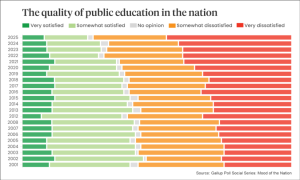

(Image by MaxZolotukhin on Shutterstock)
Survey: 1 in 3 people don’t view owning a home as part of the ‘American Dream’ anymore
NEW YORK — As the 2025 housing market takes shape, a new survey reveals that two-thirds of Americans are apprehensive about the real estate landscape, with many potential buyers feeling priced out of their dream of homeownership. The comprehensive study, conducted by IPX1031, the nation’s largest 1031 Exchange company, paints a picture of a market where rising costs and changing industry practices are forcing both buyers and sellers to adapt their strategies and expectations.
The survey of 1,002 Americans found that nearly half (49%) believe purchasing a home in 2025 is unrealistic, marking a significant shift in the traditional American Dream. In fact, one in three Americans no longer considers homeownership a crucial component of achieving that dream, suggesting a fundamental change in attitudes toward property ownership.
Despite these challenges, the market remains surprisingly active, with 51% of Americans planning to enter the housing market this year. This persistence comes even as 47% of respondents report being unable to afford a home purchase. Millennials represent the largest segment (51%) of those priced out of the market, followed by Gen X (24%), Gen Z (18%), and Baby Boomers (7%).
Market Concerns and Changing Dynamics
The survey identified several key concerns shaping the 2025 housing market. Rising home prices topped the list of worries at 34%, followed by interest rates at 22%, and tax rates at 7%. These concerns are particularly affecting current homeowners, with 35% expressing a desire to sell but feeling trapped by their existing favorable interest rates. Another 34% have resigned themselves to staying in their current homes indefinitely due to rate concerns.
The real estate industry is also adapting to significant changes in commission structures. Following a federal lawsuit ruling in August 2024, the traditional 5-7% realtor commission structure became negotiable, with sellers no longer required to cover fees for both parties. This change has created some confusion in the market, with 25% of buyers planning to stick with standard rates, 45% intending to negotiate commissions directly with their agents, and 9% remaining unaware of the new commission laws entirely.
Generational Differences in Home Buying Plans
The study revealed distinct generational patterns in home-buying intentions for 2025:
- Gen Z leads the pack with 61% planning to purchase
- 52% of Millennials intend to buy
- 46% of Gen X are considering a home purchase
- 43% of Baby Boomers plan to enter the market
Family support continues to play a crucial role in home buying, with 40% of prospective buyers expecting financial assistance from relatives. This trend is particularly pronounced among Millennials (47%) and Gen Z buyers (32%).
Buyer Preferences and Compromises
The survey uncovered interesting trends in buyer preferences and their willingness to compromise. Location preferences skew strongly toward suburban areas (49%), followed by urban (28%) and rural (23%) settings. However, two-thirds of potential buyers indicated they would sacrifice their preferred location for the right property, and 38% would compromise on the age or condition of the home.
The motivations for purchasing remain diverse, with the primary drivers being:
- A desire to transition from renting to owning
- The need for additional space
- Investment opportunities
Price expectations remain relatively modest, with 74% of buyers focusing their search on properties under $500,000. However, many are prepared for competitive bidding situations, with 45% willing to offer $20,000 or more above asking price.
While homeownership remains the preferred choice for 90% of respondents, a small but significant segment expressed a preference for renting. These individuals cited advantages such as simplified maintenance, increased flexibility for relocation, and access to more modern housing options. The survey also revealed that 25% of Americans feel social pressure to purchase a home, suggesting that cultural expectations continue to influence housing decisions.
The study showed that the market remains active across various segments, with 38% of potential buyers seeking their first home, 19% looking for second homes, and 12% pursuing investment properties. This diversity in buyer intentions suggests a complex market with multiple competing interests and needs.


Methodology
The survey was conducted in December 2024 and included 1,002 respondents from across the United States. The sample was nearly equally split between male (49%) and female (49%) respondents, with an average age of 39 years. The research was conducted by IPX1031 to understand Americans’ housing plans and concerns for 2025.








